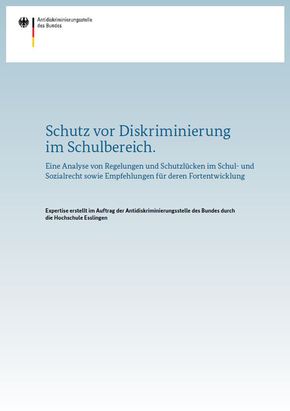Protection from discrimination in school settings
An analysis of regulations and protection gaps in school and social law as well as recommendations for their further development
- Fact sheet on the research project -
Authors: Prof. Dr. iur. Susanne Dern, Prof. Dr. iur. Alexander Schmidt, Dr. iur. Ulrike Spangenberg, published by the Federal Anti-Discrimination Agency (FADA) Year of publication: 2013
Brief overview
The expert study investigates to what extent German school law guarantees a non-discriminatory participation in education. Moreover, it offers recommendations for amending the relevant pieces of legislation under anti-discrimination aspects.
Main results
Legal framework
International and European law
Directly applicable discrimination bans and concrete protective provisions governing schools follow from several conventions under international law as well as from the EU Charter of Fundamental Rights.
Constitutional law
Germany’s Basic Law, specifically Art. 3, as well as most of the constitutions of the individual Federal Laender require the legislator and the executive - in form of the school board members and teachers - to ensure the non-discriminatory participation in education, whereby this comprises both access to and transitions among schools as well as the organisation of school attendance. At the same time, the State has the duty to protect the pupils from discrimination at the hands of other pupils.
Statutory law
Being a Federal Act, the General Equal Treatment Act (AGG) does not afford pupils protection from discrimination, since education law is the responsibility of the Federal Laender. Applicable here are the equal treatment acts and school laws adopted by each of the 16 Federal Laender, so that protection from discrimination varies widely across Germany.
Legal duties
- The right to inclusive schooling enshrined in the United Nations Convention on the Rights of Persons with Disabilities cannot be restricted as a consequence of the State’s general privilege to determine the use of its resources.
- Public authorities are obliged under international and constitutional law to enable undocumented children and youths and those who hold a temporary residence permit or whose deportation has been temporarily suspended to attend school.
- The basic right to a decent minimum standard of living implies the right to receive the means necessary for successful school attendance. It is particularly the right to inclusive schooling and the quest to grant all migrants access to school that call for supportive social measures.
- Professions of faith are protected by the constitutional right to freedom of belief that also applies in the school setting. Restrictions and bans can only be permitted as an ultima ratio in individual instances in an effort to protect the peace at school or other legal interests.
Legal protection gaps
Discrimination bans
So far, only a few school laws include explicit general bans on direct and indirect discrimination.
Access to/transition between schools
Regulations on school access only include partial discrimination bans based on individual discrimination characteristics; the discrimination characteristics referred to in the AGG are only mentioned in rare instances. By the same token, clear-cut criteria for drafting school recommendations that would prevent discriminations are missing.
Protection of persons with disabilities
Only Lower Saxony provides for inclusive schooling in the Land’s school law without invoking the privilege to determine the use of its resources.
Teaching
Only a few school laws specify educational targets on discrimination that, however, only have a limited steering force. Also, most laws fail to include an explicit ban on discriminatory teaching materials.
Procedural means of protection from discrimination
Only a few Laender provide for explicit and effective information and counselling structures to respond to and address discrimination experiences and corresponding rights of complaint.
Options for action
- The legal advancement of an anti-discrimination-culture in the school sector requires a twin-track strategy that focuses on the school laws, the elimination of the above-mentioned legal protection gaps including the lack of social support services on the one hand and, on the other, the mandatory development of antidiscrimination concepts by the individual schools with clearly defined responsibilities.
- School laws should incorporate clearly formulated discrimination bans that have both a vertical and horizontal effect.
- For the school sector, moreover, the inclusion of "social origin" as an additional discrimination category should be discussed. Specially in the school setting, bullying must be explicitly mentioned.
- School laws are to be amended to grant pupils and their parents rights to information and counselling as well as separate and effective rights of complaint, and to include specific responsibilities.
- To achieve the social compensation of unequal education opportunities, the education and participation package is to be revised focusing on pupils with disabilities, undocumented persons and migrants who have temporary residence permits or had their deportation suspended.

